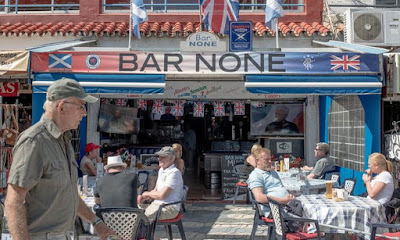 |
| EuroCitizens demonstrating last week |
On 22 February two of our members attended a working lunch organised by the European Movement and explained to a select group of politicians, lawyers, economists and journalists our objectives and how both UK nationals and Spanish citizens were being used as bargaining capital in post-Brexit Britain (more information). This proved an excellent springboard which put us on the map in terms of the press and gave us useful contacts. During this period we cooperated with a coalition of UK nationals British in Europe to produce an Alternative White Paper on citizens' rights and to carry out intensive lobbying of MPs and Lords (and Ladies) at Westminster. Unfortunately, our initially successful efforts were thwarted by the government's hardline Brexit agenda.
Over
the last few weeks we have also had further contact with British
officialdom. A meeting was held with the director of consular services
and four EuroCitizens, in which we expressed our concerns about the
possible impact of Brexit on our lives (more information).
In another meeting with a top civil servant in the Brexit department,
we asked questions about UK government policy and what was going to
happen to us. Unfortunately, we did not receive any clear answers.
Our first big event as a group was a round table in the offices of the European Parliament on 8 March (more information).
This gave us the opportunity to communicate our demands: the full
maintenance of existing citizenship rights for both Spanish and British
citizens affected by Brexit. In the round table, politicians like José
Montilla and Enrique Guerrero and experts like Robert Robinson and Ralph
Smith analysed the potential impact of Brexit on citizens. Vanesa López
Román from Españoles en el Reino Unido gave the point of view of
Spaniards in the UK. The event was well reported in the Spanish press.
On
Saturday 25 March we participated in a demonstration in Madrid to
celebrate the 60th anniversary of the Treaty of Rome. There was a good
turnout of EuroCitizens, complete with banners and some imaginative face
painting. We proved that we can get out on the streets and stridently
put forward our point of view! (more information
/ photos on Facebook). On Monday 27 March a representative of
EuroCitizens took part in a round table of trade unionists (Spanish and
European) in Valladolid. Our demands were received sympathetically by
union leaders like Ignacio Fdez Toxo (CCOO) and Pepe Álvarez (UGT) (more information).
During
the week of the activation of Clause 50 we have been involved in
frenetic media activity and have appeared in national newspapers and TV
programmes. In the last few weeks, we have also intensified our activity
on social media. The figures for our blog are illuminating: January -
2,300 hits; February - 14,000 hits; March - 61,000 hits.
Without
doubt, we have achieved our initial objectives in terms of making our
voice heard both in Spain and the UK. Now we need to carefully consider
our next steps. The next few months will be crucial in determining what
kind of package is offered to UK and Spanish citizens after Brexit.
And remember, we want to keep ALL our existing EU citizenship rights!
















